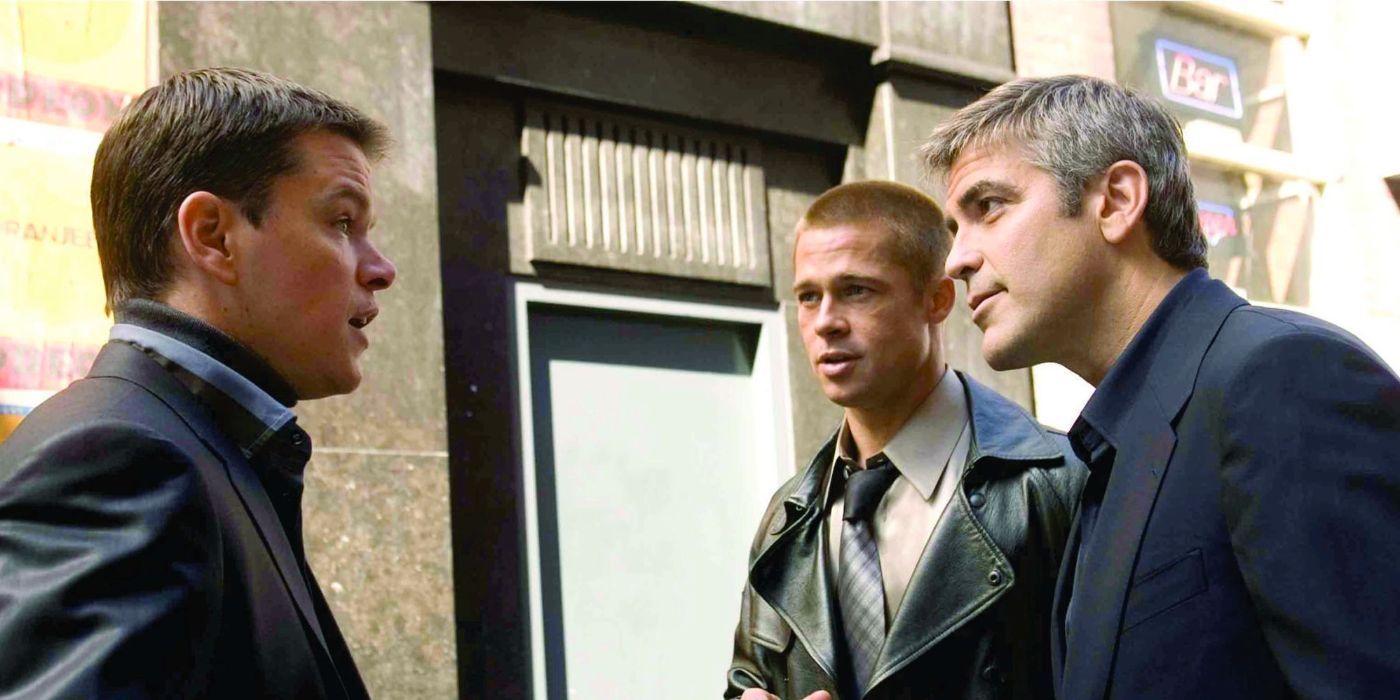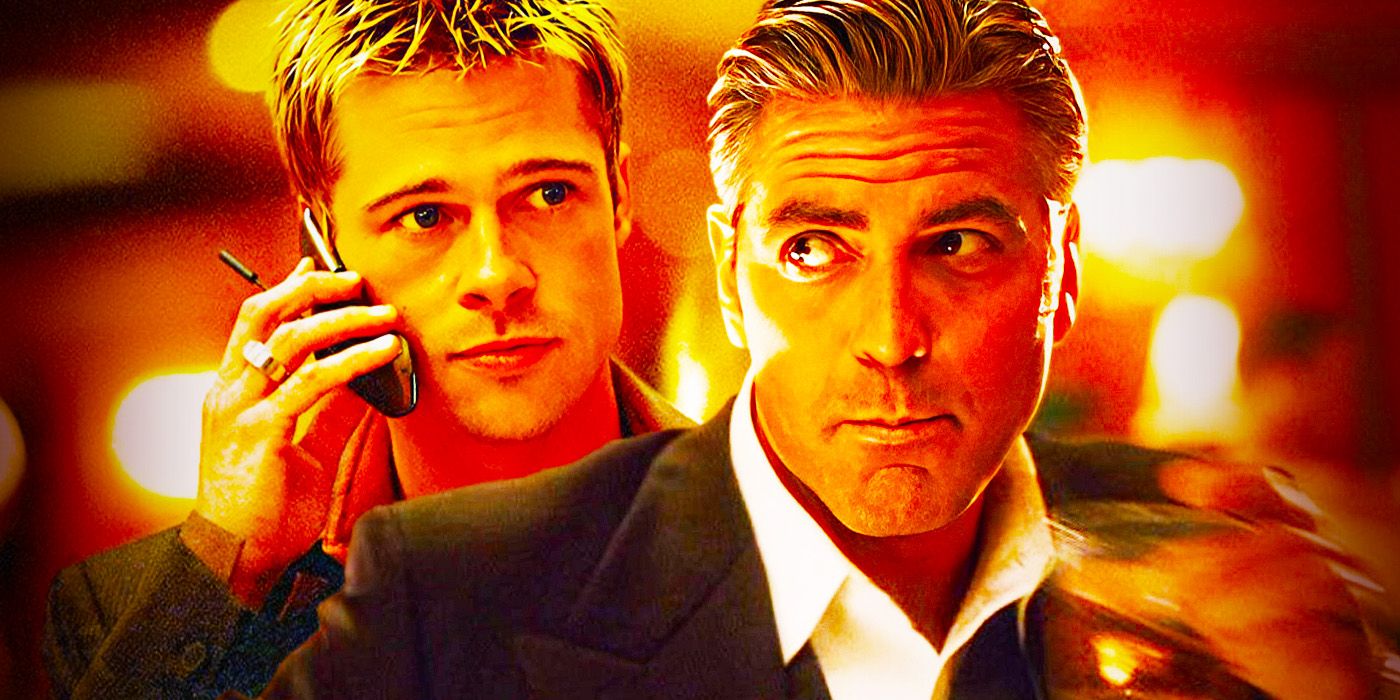Ocean’s Eleven is a classic of the heist genre, even though it does something that most heist movies steer clear of. Even though it’s one of the best heist movies ever, Ocean’s Eleven is a little unusual in some ways. It’s easy to forget these days that heists were generally darker and more violent before Ocean’s Eleven, partly because there have been so many stylistic imitators that the genre has changed a lot. By remaking a Rat Pack movie, Ocean’s Eleven evokes the stylish, playful tone of heist movies of the 1960s, rather than the gun-toting action of later classics like Heat and The Taking of Pelham 123.
Thanks to the boundless charm of the ensemble cast and Steven Soderbergh’s snappy direction, Ocean’s Eleven is a thoroughly entertaining crowdpleaser. It helped influence a new generation of heist movies, although it also cherry-picks some of the genre’s most reliable tropes. It uses a crew of eccentric characters with their own specialities, plenty of unpredictable twist, and a romance subplot that plays on the “thief-with-a-heart-of-gold” trope. Despite these familiar elements, Ocean’s Eleven also breaks one rule that heist movies have always stuck to.
There’s A Good Reason Heist Movies Don’t Often Get Sequels
Heist Franchises Can Struggle To Keep The Stakes High
The Ocean’s franchise is something of an anomaly, because it’s extremely rare for a heist movie of any kind to get a sequel. Heist movies are all about the fantasy of pulling one big job and getting away with it. This high-risk-high-reward story structure is hard to sustain across an entire franchise, since it’s usually the case that the criminals are aspiring to a life of luxury after just one robbery. The Ocean’s franchise breaks the cardinal rule of heist movies by creating sequels after the uplifting triumph of the first movie. It’s no surprise that the sequels are generally seen as inferior.
The Ocean’s franchise breaks the cardinal rule of heist movies by creating sequels after the uplifting triumph of the first movie.
There are only a few exceptions to the rule that heist movies don’t have sequels, and these exceptions often end up disappointing audiences. Now You See Me is one high-profile example, but after Now You See Me 2‘s commercial failure, the upcoming third movie faces a tough challenge. Inside Man: Most Wanted is another underwhelming heist sequel, albeit without any of the talent that made the first movie so engaging: Spike Lee, Denzel Washington and Clive Owen. The most exciting heist sequel on the horizon is Heat 2. If Michael Mann can’t pull it off, this should serve as definitive proof that it’s a futile exercise.
Although heist movies shouldn’t have sequels, there are some heist-based TV shows that find success for a few years. Take the Spanish-language Money Heist, for example, which essentially repeated its first heist with a new twist and remained just as thrilling. Netflix’s Lupin is another good example, although this works because the stakes aren’t quite the same, and the character’s robberies have higher goals. Lupin is based on a long-running series of novels by Maurice LeBlanc, so there’s plenty of material to work with, and the character is naturally suited to an ongoing format.
Ocean’s Eleven Ends On A High Note, Making The Sequels Unnecessary
The Sequels Ruin The Ending Of The Original
The ending of Ocean’s Eleven is a moment of unabashed glory, as the gang revel in their victory before going their separate ways. It’s the perfect ending to a lighthearted comedy that appeals to a broad audience. Even the brief closing scene in which Danny, Rusty and Tess are followed by two of Terry Benedict’s men can’t dampen the mood. In fact, it’s one last wry joke about how Benedict is powerless to regain his money or prove his case, and that he has to live the rest of his life bitterly ruing his mistakes. He’s been completely outsmarted, and all he can do is try desperately to find revenge.
|
The Ocean’s Franchise’s Scores On Rotten Tomatoes |
||
|
Movie |
Rotten Tomatoes Score |
Audience Score |
|
Ocean’s 11 (1960) |
47% |
81% |
|
Ocean’s Eleven (2001) |
83% |
80% |
|
Ocean’s Twelve (2004) |
55% |
60% |
|
Ocean’s Thirteen (2007) |
70% |
75% |
|
Ocean’s 8 (2018) |
69% |
47% |
The set-up of Ocean’s Twelve takes the shine off of this uplifting finale. It renders the events of Ocean’s Eleven as moot, since the gang don’t end up getting their happy ending. It’s just as disappointing as if The Sting had created a sequel in which Hooker and Gondorff are defeated by Lonnegan. Andy Garcia’s performance is part of what makes Ocean’s Eleven so entertaining, so his presence in the sequel would have been tempting under any circumstances, but it probably would have been better to engineer some other inciting incident that brings the gang back together.
It’s hard to think of too many ways that Ocean’s Twelve could have been as good as the original, simply because there’s no inherent need for it to exist. Even without Benedict tracking down the men who robbed him, a sequel would lack the spontaneity and zany energy of the original caper. The two sequels have some great moments, and the cast are always capable of getting some laughs. This shouldn’t override the story concerns, however, and if an Ocean’s sequel couldn’t find a compelling narrative reason to justify its existence, it might have been best to leave that crowdpleading ending untainted.
There’s Still Hope For The Future Of The Ocean’s Franchise
The Franchise Could Still Recapture The Magic
Although it’s been seven years since the female-led spinoff Ocean’s 8, the franchise appears to be sputtering back to life. There have been rumors about Ocean’s 14 for many years, but they haven’t carried much substance until now. The wheels finally seem to be in motion, with George Clooney speaking openly about the project while ᴅᴇᴀᴅpool 2 and Bullet Train director David Leitch is rumored to take over from Steven Soderbergh. An Ocean’s prequel with Margot Robbie and Ryan Gosling has also been confirmed, although it’s unclear when this might see the light of day.
Although the Ocean’s franchise seemed to have run its course, the idea of a belated sequel shouldn’t be discarded too easily. The franchise has gotten over the big hurdle of following up the ending of Ocean’s Eleven, and enough time has pᴀssed to allow Ocean’s 14 to be more of a soft reboot. The story doesn’t have to directly link to the original trilogy as much, which gives the sequel more freedom to come up with another enjoyable heist narrative without the burden of continuing the story. There’s also more room to maneuver with the cast, potentially bringing in some fresh faces to mix things up.
The Ocean’s prequel is another exciting prospect. Just like Ocean’s 8, it has the potential to create something original, albeit with the same stylistic DNA that fans know and love from the other movies. The ’60s setting immediately gives it a slightly different atmosphere, so it may lean into this vibe to differentiate itself from the other Ocean’s movies even further. Robbie and Gosling already made a great team once in Barbie. If they get an entertaining cast around them, there’s no reason that the prequel shouldn’t be just as lively and compelling as Ocean’s Eleven.







